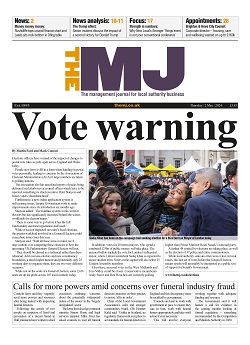Despite the challenges facing the wider audit market, North Yorkshire Council is making significant progress in handling one of the most onerous accounting tasks ever assumed by a local authority.
With the merger of eight district, borough and county councils to form a single local authority in April of this year, the new North Yorkshire Council is responsible for ensuring that the past annual statements of financial accounts of its predecessors are prepared and finalised in accordance with the relevant regulations.
This enormous mission has come at a time when there are massive delays affecting the whole local government audit system.
According to an analysis published a few weeks ago by the TaxPayers’ Alliance, just 5% of England’s councils ‘filed audited accounts for every year since 2019/20’.
Furthermore, Public Sector Audit Appointments announced last month that the cumulative number of delayed audit opinions for the accounts of local government bodies is now over 900.
These are the latest statistics in a trend that has been long in the making.
In response to this multi-year shift, the House of Commons Committee of Public Accounts published a report in June about the timeliness of local auditor reporting.
It highlighted that ‘Only 12% of local government bodies received their audit opinions in time to publish accounts for’ the financial year 2021/22.
One of the firms who left the public-sector audit market mentioned in its submission to the inquiry that a factor behind their decision is the difficulty in attracting, developing and retaining the ‘staff required to perform local authority audit work’. They explained that they experienced ‘a shortage of staff with the specialist knowledge of the local government framework’.
Other technical aspects have contributed to the delay in signing off financial statements, such as the accounting requirements for infrastructure assets, which took a long time to be addressed at a national level.
As vice chair of the Audit Committee of the recently created North Yorkshire Council, I am aware that some authorities experience unique circumstances that could lead to delays in finalising their statement of accounts.
In 2022, when preparing for the transition to one unitary authority to cover the area of North Yorkshire, members of the then North Yorkshire County Council’s Audit Committee diligently and thoroughly reviewed the financial positions of the local authorities which would cease to exist after March 2023, including holding meetings with representatives from each entity.
We wanted to learn as early as possible about the specific affairs and the variety of situations that the new Council would inherit from April 2023.
An example is a historic dispute that prevented Scarborough BC from having any of its annual statements since 2015/2016 signed off. This was the result of an objection made by residents based on the 1905 Whitby Urban District Council Act about the accounting treatment of car parking income in relation to Whitby Harbour, a matter that has warranted court proceedings.
Regardless of what the reasons leading to the high number of unaudited financial statements across the country are, it is essential that the structural causes are resolved in an effective manner to ensure that the backlog does not build up again in the future.
As public servants, the residents who elect us must be able to hold us accountable. This is not possible without offering the necessary transparency, accuracy and assurance about the finances of the councils that spend taxpayers’ money.
Given the unparalleled assignment that North Yorkshire Council is undertaking and the burden on other local authorities, I hope that the forthcoming Government’s proposals will succeed in delivering a sustainable framework.
George Jabbour is a Conservative councillor and vice-chair of the Audit Committee at North Yorkshire Council



